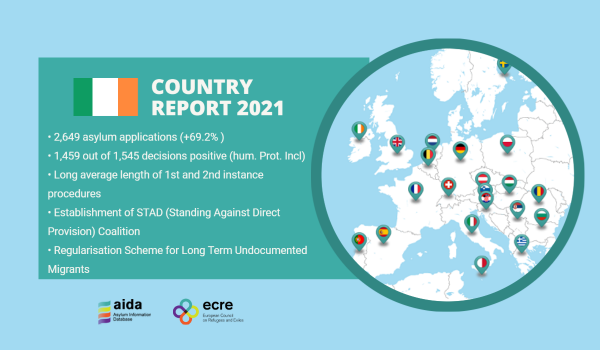The updated AIDA Country Report on Ireland provides a detailed overview on legislative and practice-related developments in asylum procedures, reception conditions, detention of asylum seekers and content of international protection in 2021.
The number of international protection applications throughout 2021 remained lower than in recent years as a result of the COVID-19 pandemic; nevertheless, the 2,649 international protection applications submitted by the end of the year represented an increase of approximately 69.2% compared to the end of 2020. Prior to the outbreak of COVID-19 in Ireland, persons whose circumstances fell outside the prioritisation criteria were waiting between 8-10 months for their substantive international protection interview, whilst applicants who successfully requested prioritisation were likely to be interviewed within 5 months. Following the outbreak of COVID-19, restrictions on the operation of the International Protection Office have resulted in significant delays to the overall procedure. The latest figures from the Department of Justice indicate that individuals whose circumstances fall outside the prioritisation criteria are waiting approximately 23 months for a decision on their application, while those who successfully seek prioritisation are waiting approximately 14 months.
Capacity in Direct Provision accommodation centres continued to be a significant issue throughout the year. As of January 2022, 1,065 individuals were housed in emergency accommodation. The housing crisis in Ireland continued to exacerbate the situation, meaning that individuals granted protection status or permission to remain have been unable to leave Direct Provision accommodation due to a lack of available and affordable housing. Despite a commitment by the Minister for Children, Equality, Disability, Integration and Youth to decommission the use of emergency accommodation prior to year-end, 24 emergency accommodation centres remained in operation as of December 2021. As a consequence of such delays the STAD (Standing Against Direct Provision) coalition was founded by eight NGOs in January 2022, with a view to lobbying the Government to deliver on the commitment to bring an end to direct provision in the next two years. The coalition’s primary aim is to replace Direct Provision with an alternative system by 2024, ensure that all emergency reception centres are closed as an immediate priority and reduce processing times for international protection applications and appeals.
Despite such issues, various positive developments were registered throughout the year. Among them were the facts that persons subjected to the inadmissibility procedure started being provided with reception conditions and that the HSE’s Medical Card Unit enabled eligible international protection applicants living outside of Direct Provision to obtain medical cards and access free medical services, prescription medicines and hospital care. Significant changes were also introduced for citizenship applicants, limiting the number of proofs required to establish identity and residency for the purposes of making a naturalisation application. Additionally, from January 2022, new applicants for citizenship are not required to submit their original passport with their initial application.
Particularly significant was the introduction of the scheme to regularise long-term undocumented migrants in January 2022. The scheme will enable applicants and their eligible dependants to remain and reside in Ireland and to regularise their residence status whereby the applicant has a period of 4 years residence in the State without an immigration permission, or 3 years for applicants with minor children, immediately prior to the date on which the scheme opens for applications. Those with an existing Deportation Order can apply whereby they meet the minimum undocumented residence requirement. International protection applicants who have an outstanding application for international protection and have been in the asylum process for a minimum of 2 years are also permitted to apply and will have a separate application process.
This article appeared in the ECRE Weekly Bulletin. You can subscribe to the Weekly Bulletin here.

